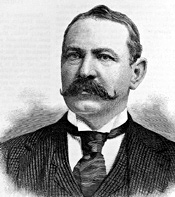Levi Maish facts for kids
Levi Maish (born November 22, 1837 – died February 26, 1899) was an important American politician. He was a member of the Democratic Party. Maish served as a U.S. Representative for the state of Pennsylvania. This means he helped make laws for the country.
Contents
Early Life and Education
Levi Maish was born in Conewago Township, York County, Pennsylvania. This was in 1837. He went to local schools. He also attended the York County Academy. After finishing his studies, Maish became a teacher. He taught in Manchester Township and in York.
Service During the Civil War
During the American Civil War, Levi Maish played an active role. In 1862, he helped gather a group of soldiers for the Union Army. He joined the 130th Pennsylvania Volunteer Infantry. He started as a Captain.
Military Promotions and Injury
Maish was soon promoted to lieutenant colonel. This was due to his education and skills. Less than two months later, he fought in the Battle of Antietam. During this battle, he was badly wounded. He was hit in his upper chest and lung. This happened while he was leading an advance across a cornfield. The enemy had a strong defensive position.
While he was recovering from his injury, he received another promotion. He became a colonel. After the Battle of Fredericksburg, his time of service ended. He left the army with his regiment on May 21, 1863.
Law and State Government
After the war, Maish continued his education. He studied law at the University of Pennsylvania in Philadelphia. He became a lawyer in 1864.
Serving Pennsylvania
Maish then entered state politics. He served as a member of the Pennsylvania State House of Representatives. He held this position in 1867 and 1868. In 1872, the state legislature chose him for a special task. He was part of a group that checked the financial records. This group looked at the accounts of public officers in York County, Pennsylvania.
United States House of Representatives
Levi Maish was elected to the United States House of Representatives. He was a Democrat. He served in the Forty-fourth and Forty-fifth Congresses. He tried to be reelected in 1878 but was not successful.
Later Congressional Terms
He was elected again later. He served in the Fiftieth and Fifty-first Congresses. In 1890, he ran for reelection again but lost. After his time in Congress, he continued to work as a lawyer. He practiced law in Washington, D.C.. He passed away there in 1899. He was buried at Arlington National Cemetery.
Freemasonry Involvement
Levi Maish also joined a group called Freemasonry. He became a Mason in York Lodge No. 266 in York, Pennsylvania. This happened on January 6, 1863. In 1869, he left that lodge. He then became a founding member of Zeredatha Lodge No. 451, also in York. He was later chosen to lead this lodge as its Worshipful Master in 1873.
 | Sharif Bey |
 | Hale Woodruff |
 | Richmond Barthé |
 | Purvis Young |


